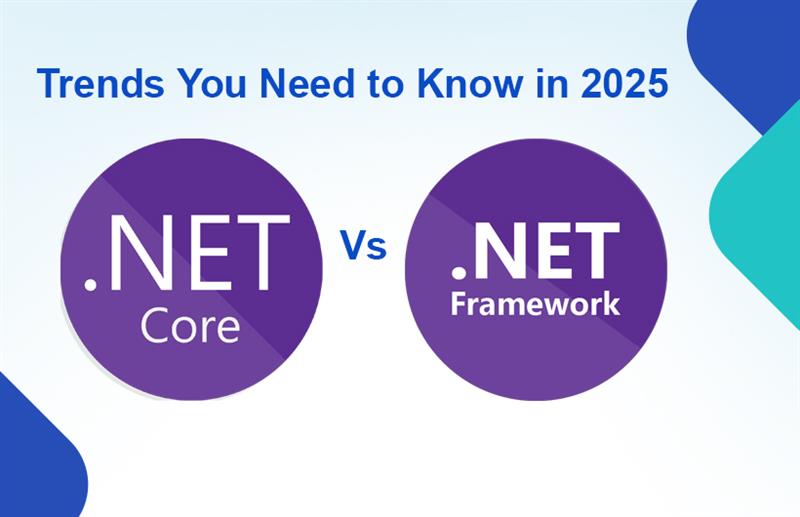The debate between .NET Core vs .NET Framework has shaped the world of application development for years. As we step into 2025, this discussion has become even more relevant for businesses, developers, and organisations looking to invest in scalable and future-ready solutions. Although both platforms still find their application in web application development services, the usage has changed according to the current priorities of businesses as well as skill bases of developers in the .NET industry.
This blog will compare and contrast these two, so you understand specific trends that drive their adoption in 2025 and which is best suited to your project.
What is .NET Framework?
The first development framework developed by Microsoft was the .NET Framework, which was released in the early 2000s. It was aimed at giving .NET developers a familiar programming framework to create desktop, web, and enterprise computerised applications.
- Targeted to applications that are Windows-only.
- Supports languages like C, VB. NET and F.
- Fully-grown ecosystem, libraries, APIs, and community support.
- Best suited to enterprise-grade, legacy applications that need stability.
Although the .NET Framework has served well in the past several decades, it has disadvantages, including its limited compatibility with non-Windows operating systems and its slower adaptation to new technologies compared to other systems, such as those expected in 2025.
What is .NET Core?
.NET Core was the response by Microsoft to the need to have a modern, cross-platform development environment. Originally released in 2016, it was a reengineered variant of .NET that was keen on speed, flexibility, and scalability.
- Multi-platform- Windows, macOS, and Linux.
- A cloud-optimised and containerised environment.
- Increased performance and faster run time than the conventional framework.
- An actively supported and maintained software, the updates are regular.
In 2020, Microsoft released .NET 5 and then .NET 6, 7, and 8, unifying .NET Core and .NET Framework into a single platform known simply as NET. In spite of this, developers and businesses continue to make project decisions based on the differences between the legacy .NET Framework and the modern .NET Core/.NET 8+.
.NET Core vs .NET Framework in 2025: Quick Comparison
| Feature | .NET Framework | .NET Core (.NET 8/9 in 2025) |
| Platform Support | Windows-only | Cross-platform (Windows, Linux, macOS) |
| Performance | Slower, heavier | High-performance, lightweight |
| Deployment | Centralized, requires full installation | Modular, self-contained deployments |
| Best Use Cases | Legacy apps, enterprise intranets, Windows desktop apps | Cloud-native, microservices, modern web apps, cross-platform solutions |
| Community Support | Mature, but slowing down | Growing rapidly, highly active |
| Future Outlook | Maintenance mode | Continuous development & updates |
This table makes one thing clear: .NET Core is the future while the .NET Framework holds value for organisations still running mission-critical legacy systems.
Why .NET Framework Still Matters in 2025
It’s easy to assume that the .NET Framework is obsolete, but that’s not the case. Many large enterprises continue to rely on it for their enterprise-level systems. The reasons include:
1. Legacy investment: Decades of investment in .NET Framework development make migration costly.
2. Windows integration: Applications deeply tied to Windows infrastructure remain easier to maintain in the framework.
3. Stable ecosystem: For industries like finance or healthcare where stability matters more than agility, the .NET Framework is a reliable option.
For organisations with long-standing Windows-based infrastructure, moving entirely to .NET Core may not yet be practical.
Why .NET Core Leads the Way in 2025
On the other hand, .NET Core (or the unified .NET 8/9) is setting the standard for modern .NET Framework development:
1. Cloud-first development: The growing momentum in Azure, AWS, and Google Cloud is making .NET Core cloud-native capability especially appealing.
2. Development of microservices: The industry is adopting modular design patterns, and with .NET Core, it is an easy task to containerise applications using Docker and Kubernetes.
3. High performance: Benchmark results in 2025 reaffirm that benchmark tests still show that .NET Core improves in speed and scalability results relative to the legacy framework.
4. Cross-platform benefit: No more desire on the part of businesses to be trapped in Windows-only ecosystems.
In brief, whenever you plan to have a new build web application, .NET framework development in 2025, it is always the wiser decision to use .NET Core.
Key Trends Shaping .NET Development in 2025
The .NET environment is fast improving. These are the most important trends you need to know:
1. Unified .NET platform shows traction
Microsoft has standardised the development experience between platforms with the launch of .NET 8 and the soon-to-be-released .NET 9. Developers do not need to select between Core and Framework to create a new project anymore. Nevertheless, the branding difference can make organisations decide between modernisation and maintaining their legacy systems.
2. Expansion of the Cloud-Native Apps
Firms are increasingly developing applications that are specifically optimised for the cloud. The combination of serverless computing, containers, and microservices makes .NET Core the platform of choice to respond to this new reality.
3. Integration of AIs and Machine Learning
As the AI-focused applications are also developing, .NET Core is embraced to support ML.NET and AI-focused APIs. Enterprise and consumer applications now can embed AI capabilities by .NET developers
4. Cross-Platform Mobile and Desktop with MAUI
.NET MAUI (Multi-platform App UI) allows developers to create apps for Android, iOS, macOS, and Windows using a single codebase. This accelerates cross-platform development, reducing costs and speeding up time-to-market.
5. Continued Support for Legacy Systems
Despite modernisation, enterprises are investing in hybrid approaches—maintaining .NET Framework for stable legacy apps while using .NET Core for new projects. This dual strategy will be a reality by 2025.
Which Should You Choose in 2025? (.NET Core vs .NET Framework)
Choosing between .NET Core and .NET Framework depends on your business goals, infrastructure, and timeline. Here’s a straightforward guide:
Choose .NET Framework if:
- Your application is an old source that is Windows-based.
- It is more essential that a company should be stable rather than inventive.
- The prices of migration exceed the possible returns.
Choose .NET Core if:
- You are looking at some cross-platform support and cloud-native capabilities.
- You are developing contemporary web, mobile, or desktop appliances.
- Performance, scaling, and responsiveness are key factors.
- You desire to future-proof your investment with a Microsoft-supported roadmap.
The Future Prognosis
As of 2025, development of the .NET framework is mostly in maintenance mode. Microsoft still maintains it about security and bug-fix releases, but major innovations are now managed by the unified versions of .NET Core.
This implies that businesses will run the risk of lagging in modernisation. Through the application of .NET Core, more startups and tech-oriented businesses have already fast-tracked their web app development services and derived some competitive advantage.
The question is no longer the question of “What is better?” but is instead one of the question of how soon an organisation can migrate.
How Monarch Innovation Can Help
Monarch Innovation is well aware of the problems that corporations encounter when choosing between the .NET Core and .NET Framework. You may be looking to modernise your existing mission-critical legacy application, or to create a truly cross-platform application. Our team of .NET experts will see you through.
Our area of expertise is custom web application development that is in accordance with your business requirements.
- We work on high levels of performance, elasticity, and maintainability.
- We assist companies in moving to .NET Core without disrupting business.
- Having a thorough knowledge of enterprise systems and contemporary architectures, we make sure that your applications are both present-day and future-proof.
Sign up with Monarch Innovation to fully utilise the capabilities of the .NET Core vs .NET Framework ecosystem and streamline your technology stack in 2025.
Final Thoughts
The .NET Core vs .NET Framework debate in 2025 is less about competition and more about transition. The .NET Framework continues to support critical legacy applications, but the future clearly belongs to .NET Core and the unified .NET platform.
For businesses, the question is no longer whether to adopt .NET Core—it’s how quickly you can make the switch to stay competitive.
With the right guidance and expertise, your business can balance the reliability of the old with the innovation of the new. That’s where Monarch Innovation comes in—helping you make technology decisions with clarity, confidence, and precision.
Looking to modernise your applications or build powerful new solutions? Connect with Monarch Innovation today and discover how our .NET development expertise can drive your business forward.





